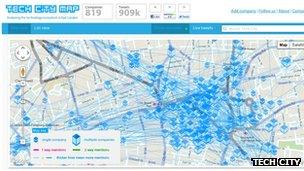London's Tech City growth hailed by PM Cameron
- Published

The UK Prime Minister has unveiled an interactive map of East London's technology cluster, revealing more than 600 firms in the area.
The Tech City map highlights the expansion of Old Street's "silicon roundabout". By comparison there were around 200 tech firms based there last year.
The government said it was acting to support the area's success.
However, some businesses claimed they did not want the attention.
"One year ago we made a major commitment to helping the tech cluster in East London grow," said David Cameron.
"The successful growth we see today is thanks to the talented, creative entrepreneurs who have decided to set up there.
"As a government, we are determined to continue doing everything we can to help support and accelerate this growth."
Support
Downing Street highlighted a 225% rise in the research and development tax credit offered to small and medium sized enterprises, a doubling of capital gains tax relief to £10m for start-up owners and an "Entrepreneur Visa" to help attract talent.
The government is now asking investors and business leaders to tell it what else can be done to cut red tape.
It hopes the cluster will continue to expand further east to the capital's new district, Olympic Park.
Telecoms equipment maker, Cisco, used the occasion to announce it is creating a centre to research "smart infrastructure" in partnership with Imperial College London and University College London.
Intel also revealed it will create a high performance computing cluster to offer local firms the chance to sample its latest technologies.
'Go Away'
Online music service Songkick tweeted that "Our CTO just met with David Cameron to discuss Tech City, apparently 'he was genuinely engaged in helping tech start-ups'".
However, others expressed reservations about all the interest.
"The cluster has arisen spontaneously. It's at a delicate early stage," Andy Bell, chief creative officer of Mint Digital, wrote in a company blog.
"It takes an arrogance for the government to assume that its heavy hand can help it grow. The best thing the government can do is get out of our hair and use the money to reduce their funding gap or, if they really want, throw a big party."
Other tech firms said that they were concerned local rents were starting to rise as big industry players - such as Google - moved into the area.
"In the late nineties the flourishing cultural scene in Shoreditch led to a surge in residential property prices which rapidly drove out the very artists and fashion designers who had brought the area to life," said Charles Armstrong, chief executive of Trampoline Systems.
"There's a real concern the current surge in commercial property prices may have the same effect on the start-ups and independent retailers who form the bedrock of the local economy.
"If Shoreditch becomes a bland neighbourhood of corporations and chain cafes the flourishing startup scene could be stopped dead in its tracks."
- Published10 November 2011
- Published10 November 2011
- Published28 September 2011
- Published8 September 2011